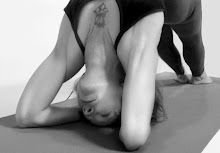The Whole Human

"To be human
is to become visible
while carrying
what is hidden
as a gift to others."
excerpt from What to Remember When Waking by David Whyte, contained in the collection The House of Belonging published by Many Rivers Press
To be a "whole" human, according to the principles of Yoga, is to unite body, mind, and spirit. True health cannot separate any of these three components; if one is weak, the others will eventually weaken. As we learn to strengthen one area, often the others will follow. There is no one right way to begin; some begin by strengthening the body, others the mind, and still others focus on the spirit.
The Ashtanga Yoga method, taught by Sri K. Pattabhi Jois, begins with physical training; a strong, supple body becomes a fit vehicle for the spirit and trains the practitioner to apply the principle of non-harming first to the self and then by extension to others.
The word "ashtanga" means "eight limbs" in the Sanskrit language. The physical limb, "Asana", is the 3rd limb or component of the complete practice. The other limbs are:
Yama (personal ethics)
Niyama (personal observances)
Asana (physical training)
Pranayama (proper breathing)
Pratyahara (withdrawal from negative influence, opening to positive influence)
Dharana (concentration)
Dhyana (meditation)
Samadhi (union)
The physical practice of Yoga is mere gymnastics if the other limbs are ignored; one need not be perfect, everyone's growth will not be at the same rate. Some will become quite proficient at advanced postures but run the risk of developing an egotistical attachment to their demonstration and the attention that the less gifted may bestow on them. Others may be unable to perform even the simplest postures while developing formidable intellectual talents. And how many of us have had the honor of being in the presence of a "saint"? These saints live in bliss and feel unconditional love for all they meet but they often have no formal education and may never practice a formal asana routine. Some may even be physically disabled.
As you begin your own practice, avoid judging yourself by what you see others do. Concentrate on your own practice, and each time you finish simply note what you have accomplished without applying a value to it. Your practice is not "good", or "bad", or "fruitful", it simply is what it is today.
The longer you practice, the more you will see the wisdom in it and the more you will be able to see how to apply the principles to every aspect of your daily life.



